






See more Homecoming Weekend photos on page 28.









See more Homecoming Weekend photos on page 28.

No person shall, on the grounds of race, color, sex, sexual orientation, religion, national origin, age, disability, veteran status, or genetic information be excluded from employment or participation in, be denied the benefits of, or otherwise be subjected to discrimination, under any program or activity conducted by Georgia College.

Georgia College provided medical supplies in late March for the fight against COVID-19 across Georgia. These critical supplies were used by the Department of Public Health (DPH) and the Georgia Emergency Management and Homeland Security Agency (GEMA) in areas around the state.
The call for critical medical supplies came from the University System of Georgia (USG) and requested all public safety and emergency management personnel to collect medical supplies that are typically used for everything from research and campus maintenance to nursing programs and on-campus health clinics.
"Doing our part to deliver aid during this time of crisis is critical in combatting COVID-19 across the state — but it's also just the right thing to do," said President Steve Dorman. "I'd like to thank all departments at Georgia College for acting swiftly to
collect supplies from across campus to be distributed by GEMA throughout the state to Georgia's front-line medical care workers in dire need."

Departments and offices around Georgia College aided in taking stock of their equipment and pulling supplies to be redistributed. Among those that provided supplies were the Departments of Biology and Chemistry, the Schools of Nursing and Health and Human Performance, the Student Health Center, and Facilities Operations. Supplies that were provided include:
• 115 assorted size containers of hand sanitizer
• 28 face shields
• 650 shoe covers
• 440 pairs of safety glasses/goggles
• 87,377 nitrile/vinyl gloves
• Two medical ventilators
The Coronavirus created hardship for Georgia College students, making it extremely difficult for them to fund basic necessities.
The Helping Hands Hardship Fund was originally conceived by the Student Government Association (SGA) to help students with unusual situations who need a helping hand. With the COVID-19 crisis, University Advancement, Student Life, and the Office of Financial Aid came together and made a decision to aid students who are facing significant financial hardships as a result of the pandemic.

“The biggest need we saw was for money to buy food,” said Dr. Shawn Brooks, vice president for Student Life. “The amount of need is immeasurable. Most students are asking for only a portion of their overall need, as they know funds are limited.”
The university received more than 260 requests from students needing financial assistance.
“Dr. Shawn Brooks and Student Life recognized that some GC students may be facing extreme hardships, because they were no longer employed in local businesses, did not have access to technology needed in an online environment, or couldn’t afford
the costs associated with moving from campus housing to other housing,” said Monica Delisa, vice president of university advancement. “Student Life reached out to Advancement and the Office of Financial Aid, and we identified this fund as being setup for exactly this type of crisis.” Learn
Michael Lackey, the 2020 Martha Daniel Newell Visiting Scholar, became fascinated by the world of biofiction nearly eight years ago upon picking up a copy of Jay Parini’s “Benjamin’s Crossing.” The novel, written about the famous scholar and literary critic Walter Benjamin, is written in the genre of biofiction that names its protagonist after an actual historical figure.
“My students absolutely love biofiction,” said Lackey, who teaches at the University of Minnesota Morris. “In fact, at the end of every biofiction course I have taught, students have asked me to recommend biographical novels for them to read. This is precisely what we professors want for our students — for them to be so excited about learning that they will read literature on their own.”
Lackey saw the response from his own students in Minnesota and was curious if other students find the genre as enthralling. He applied for the Martha Daniel Newell Visiting Scholar and his suspicions were confirmed. “My Georgia College students were extremely enthusiastic about biofiction,” he said.
In his spring semester, his vision was to have students do public interviews with
famous biographical novelists Joanna Scott and Lance Olsen. In February, two students interviewed Scott at an event titled Feminist Bioficition. Scott had dinner with the two students that interviewed her, met with prospective writers to give them suggestions about grants and fellowships, and even gave advice on authoring publishable fiction.
Unfortunately, the disruption caused by COVID-19 cancelled the Olsen interview. However, two students were able to conduct a valuable email interview with Olsen over the course of the semester.
“My teaching is about empowering students; and giving students the opportunity to work closely with famous authors and preparing them to engage professionally with intellectuals enables them to understand how they can contribute to the world of literature and thought,” said Lackey.
Lackey remarked that the purpose of the genre is to give readers a deeper look into the complexities of the life surrounding historical figures — one that isn’t always recorded in the history books.
“Readers don’t go to biofiction to get an
accurate portrait of someone like Walter Benjamin; rather, they read such works in order to understand what it means to be human and how we live,” he said.
Closely tied to Lackey’s work is a focus on social justice. Lackey notes Charles Johnson’s novel “Dreamer” as being a prime example of how the two can be closely tied. In “Dreamer,” Johnson explores Dr. Martin Luther King, Jr.’s support of socialism and how it affected his choices to mobilize a movement.
According to Lackey, “what emerges in the pages of ‘Dreamer,’ then, is an extremely complex man: a King who had to sacrifice some of his ideals for the sake of reaching a larger audience, and a man who was never really certain whether he succeeded or failed.”
Lackey reflected that his biggest takeaway from his time at Georgia College has been the extraordinary students he met.
He said, “I am immensely grateful to Martha Daniel Newell for making it possible for me to teach and learn from such smart and motivated students, like the ones I met during my semester on this campus.”
As COVID-19 was changing the way we work and live, more than 60 Georgia College students lost the chance to orally present undergraduate research at prestigious peer gatherings nationwide.
Georgia College moved quickly to ensure students did not also lose the opportunity to present their findings at its spring conference, as well.
Just in time for National Undergraduate Research Week, Georgia College hosted its 23rd Annual Undergraduate Research Conference. Normally held on campus, it was reorganized to stream online.
Faculty, students, staff, and community members could interact with researchers via comment boxes.
“When we reached out to students and told them we weren’t canceling our research conference, they were pretty excited,” said Dr. Jordan Cofer, associate provost for transformative learning experiences.
Never once did Dr. Doreen Sams, marketing professor and coordinator for Mentored Undergraduate Research and Creative Endeavors (MURACE), think of canceling Georgia College’s undergraduate research conference.
Sams and Kelly Massey, conference co-chairs, joined Cofer to work with Holly Croft, digital archivist at Ina Dillard Russell Library, to put the undergraduate research conference online.
“There are always unforeseeable challenges,” Cofer said, “but Georgia College has such good people that we’ve been able to keep moving with this conference, despite the hiccups.”
“This is an exciting opportunity to see what works online,” he added. “It might open up some new avenues for us going into the future.”
The review process to be accepted to Georgia College’s conference was waived this year for students who had other conferences canceled. Sams hopes this will result in more students presenting this year. They expected to have about 84 participants.
The pandemic has “given rural America an amplified voice,” Womack remarked. Issues she’s been talking about for decades, like lack of broadband internet, are now apparent for all to see.
Georgia College’s innovative Rural Studies Institute was established in January. As Dr. Veronica Womack settled into her new role as its executive director, a global pandemic sent millions of people home to work remotely by computer — giving more urgency and meaning to Womack’s work.

“The current crisis emphasizes some of the most difficult challenges of living in rural places. As we retool our educational systems for online learning, those rural communities with limited access to broadband will have an enormous hurdle to overcome in order to participate,” said Womack.
“In addition,” Womack said, “many rural communities have few hospitals and emergency care services. So, during a world pandemic, they are vulnerable. Many people who live in rural places are in the hard-hit service economy. For recovery in these communities, they will need assistance.”
Rural areas also need infrastructure of roads, bridges, and water/sewer systems. They need funding to build up their communities with employment “that allows for thriving, not just surviving,” according to Womack. To navigate the 21st century successfully, rural residents need to be retrained and given new tools and skills. In addition, young people need jobs and entrepreneurial opportunities to keep them from leaving rural hometowns for the city.
The Rural Studies Institute is meant to fill in these gaps. The Institute will produce research and community-building models to resuscitate and strengthen rural life in Baldwin County, Georgia, and nationwide.
By partnering with local communities, Womack said she’ll listen to residents and document their wisdom and stories — while also offering the knowledge and expertise found at the university level. Using both, she believes a more comprehensive and beneficial plan for development can be developed.
Doing her part by staying at home didn’t seem like enough. Cathleen O’Neal wanted to do more to help her neighbors and the world get through the COVID-19 crisis.
As Georgia College’s Costume Supervisor — charged with making costumes for productions performed by the department of theatre — O’Neal put her sewing skills to good use. In two weeks, O'Neal constructed 140 masks — donating 110 surgical and N-95 face covers for Atlanta area hospitals and 30 N-95 face masks to meet a critical need at Eatonton Health & Rehabilitation nursing home.
It took about 10 minutes for O’Neal to make one pleated, surgical mask. About 50 surgical masks can be sewn in a day without breaks. The N-95s are more involved with wired pockets around the nose that hold filters.
O’Neal used fabric leftover from past student projects — colorful, polka dotted, striped, and some even featuring baby elephants. She washes the fabric and frequently sanitizes her cutting tools.
“Just sitting around the house, watching the news, it gets very daunting — especially if you’re helping by staying at home, but you want to do something more,” she said. “This really spoke to me. It’s a great way for the community and those of us in the theatre and costume world to help out in our way. It warms my heart that I can do something.”
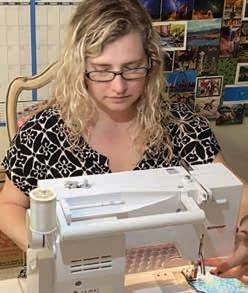
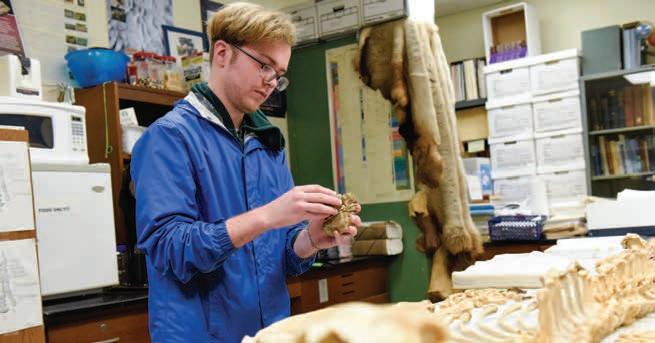
Colin Calvert helped perfect a mathematical ‘regression equation’ to determine the length of Georgian sea snakes that lived 30 million years ago.
Calvert used 400 bones from modern snakes to make the math equation. He then used the formula to calculate the length of ancient sea snakes, using 40 vertebrae fossils — some as large as an inch — that he chiseled out of a kaolin mine in Wilkinson County with paleontologist and professor Dr. Al Mead.
He discovered the 30 million-yearold bones were from snakes as long as 16-feet.
“There’s never been a good, solid estimate of how long ancient sea snakes were in this area — so, that’s
new,” Mead said. “A 16-footer is unusual. That’s a big snake. Probably the biggest rattle snake today’s going to be six feet. So, these were massive snakes.”
“We have a lot of confidence we can take any snake vertebrae and determine the length of the snake, using this equation,” he said.
The study also confirmed the existence of two species of sea snakes in this area in prehistoric times: Palaeophis and Pterosphenus. They were the marine version of modern-day boas.
“This has been a great experience,” said Calvert. “There’s definitely a really good interaction with your professors at Georgia College that you wouldn’t get at a larger school.”
who pinpointed a local critical need for hospital gowns.
Junior Kelly Bousquette has been named a 2020 Newman Civic Fellow. She was nominated for the fellowship by Georgia College President Steve Dorman who said her organization, Students for Change, created a "very important link between Georgia College students and the larger community."

It was this link that earned her a place among the nearly 300 nationwide recipients of the 2020 Newman Civic Fellowship.
She started the organization in September 2019, to "help advocate, fundraise, and aid with the CSHLRA (Central State Hospital Local Redevelopment Authority) projects including the development of a community garden/greenhouse, homeless shelter, rape crisis center, and mental health museum," said Bousquette.
Bousquette is a quadruple major in liberal studies, psychology, sociology, and criminal justice.
The Newman Civic Fellowship was created to recognize students for their contribution to public issues. It will grant Bousquette access to resources and mentorships throughout the 2020-2021 academic year, as well as scholarship and postgraduate opportunities. Bousquette is hoping that she'll be able to pass on the knowledge to the leaders in her organization.
Two UV-C lamps — that disinfect against bacteria and viruses — were donated in April by Georgia College to Navicent Health Baldwin Hospital, along with 100 medical gowns.

The lamps can be used to prolong the life of disposable isolation gowns, making them reusable at a time most hospitals are facing shortages from COVID-19.
Dr. Sheri Noviello, dean of Health Sciences at Georgia College, reached out to the chief nursing officer at Navicent Health Baldwin,
Problem-solving by distance, Noviello discovered there were 100 gowns at Georgia College Public Safety that were a part of the university’s emergency management and disaster response program.
“When a patient is in isolation — that requires a gown,” Noviello said. “Every health care personnel who enters the room must also put on a gown. Every time someone leaves that patient’s room, the gown must be thrown away.”
Noviello also realized heat from UV-C lamps could allow medical personnel to disinfect and safely reuse the gowns. She was put in touch with Dr. Chavonda Mills, chair of Chemistry, Physics, and Astronomy, whose department had three UVC lamps.
On campus, lamps are used in organic chemistry to illuminate molecules that shine under UV light and appear as different colors.
Six students — with majors in chemistry, music therapy, physics, and psychology — represented themselves and Georgia College in February at the second annual “Posters at the Georgia State Capitol.”

The undergraduates were among 54 students from 15 colleges and universities statewide, who participated at the Georgia State Capitol building in Atlanta. Multiple members of the state House and Senate stopped by to see research posters, along with lobbyists and legislative staffers.
The six Georgia College undergraduates at the Capitol this year were:
• Senior Chemistry major Megan Andrews, who is studying prostate cancer in men of African descent. This population is disproportionately affected by the disease. She’s working with three Georgia College Chemistry and Public Health professors, along with the state Department of Public Health, to determine how socioeconomic status affects onset of this particular cancer. The professors are Dr. Wathsala Medawala and Dr. Chavonda Mills, who helped with chemistry and hormonal data, and Dr. Ernest Kaninjing, who helped design the project.
• Senior Ashley Newkirk, who used music therapy to help a firstgrade student with autism increase his ability to follow directions, communicate, and be more social. Working with Katie Whipple in Creative Art Therapies, Newkirk used various musical interventions, including instruments and dance, to promote social interaction between the boy and his peers.
• Senior Physics major Bo Cavender, who helped build a portable solar charging station that tracks the sun to generate energy as a power source for cell phones and laptops anywhere on campus.
Cavender works with Dr. Hasitha Mahabaduge in the Condensed Matter Research Group. As a mentor, he said Mahabaduge knows when to step back and when to offer advice.
• Sophomore physics major Catherine Boyd, who determined whether solar panels could improve the battery performance of golf carts. This involved hooking solar panels up to golf cart batteries and measuring voltage and current. She worked with Mahabaduge as well, learning how to analyze data and present research.
• Senior psychology majors Madeline Drives and Amelia DuBose, who are studying aggression levels in children, perceived by parents and teachers, and how this connects to socioeconomic status. They are working with Dr. Tsu-Ming Chiang, who helped spark their interest in research.
Georgia College professor of instructional technology Dr. Chris Greer hopes to bring new opportunities for students to learn topics like science and history using virtual reality (VR). His YouTube channel, Virtual Reality Georgia, brings sites across the state to life — one of the first to highlight locations in Georgia using VR.

“The end game is to have sites from all over Georgia,” said Greer. “From state parks to museums, we hope to make these sites available to K-12 teachers and students as well as the general public.”
Using a 360-degree camera, Greer and his graduate assistant Hannah Jones visited locations like the Ocmulgee Mounds
National Historical Park, the Old Governor’s Mansion, Smithgall State Park in Helen, and Cumberland Island.
Last fall, Greer presented the project at a conference and was approached by Georgia Public Broadcasting (GPB) to collaborate.
Now the videos Greer and Jones put together will be featured on GPB’s virtual field trips website.
“This helps us get our content out to a broader audience quickly,” Greer said about the GPB partnership. “They have a common goal — it’s all about access to benefit education in Georgia.”
Virtual reality ‘field trips’ for students created by Georgia College team
Georgia College commemorated two campus buildings in February with a groundbreaking ceremony for its Integrated Science Complex and ribbon cutting for newly-renovated Terrell Hall.

University President Dr. Steve Dorman was one of a dozen officials who dug ceremonial shovels of dirt — officially commencing construction of Georgia College’s first new academic structure to be built since the Arts and Sciences building in 1995. The Integrated Science Complex will be located at the corner of Montgomery and Wilkinson Streets across from Herty Hall.
Dorman also presided over a ribbon cutting at Terrell Hall on Front Campus. Originally built in 1908, Terrell is one of the university’s oldest structures. Its new use will be for communication technology and studies.
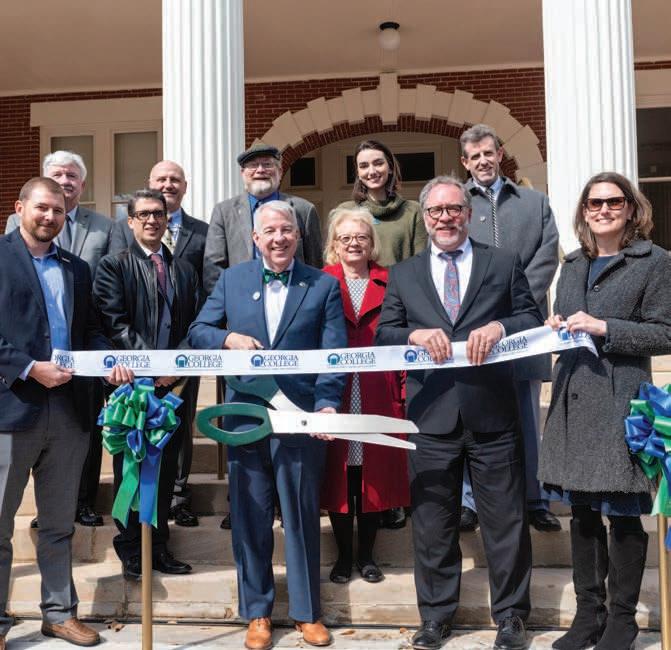
“I am delighted to break ground on our new Integrated Science Complex,” Dorman said. “This will greatly expand upon our existing strengths in our science programs at Georgia College and provide our students and faculty members with state-of-theart facilities focused on science, technology, and research.” “In addition,” he said, “I am delighted to re-open historic Terrell Hall. The improvements we made to the historical character of the building are breathtaking. This facility brings together all the relevant areas of mass communications and media studies, and it greatly expands opportunities for our students.”
The $22.1 million Integrated Science Complex will be three full floors with advanced equipment and spaces for students to gather, collaborate, and use for study. Completion for the 43,000 sq. ft. building is slated for late spring 2021. New space will allow the university to offer a concentration in the growing field of forensic chemistry and more science education courses for students who want to teach science.
Terrell’s $13.3 million renovations took two years to complete.
Historic elements obscured in the 1970s were salvaged — like higher ceilings, wider hallways, old flooring, and windows that were covered up. Modern updates include advanced multimedia laboratories and engaged-learning classrooms featuring cutting-edge communications technology. There are small classrooms, sun-filled work spaces for students, a large screening room, and debate area. Georgia College’s collaborative student newsroom will also be in Terrell.
Shortly after the re-opening of Terrell Hall, on March 7, 2020, a room was dedicated in the building in honor of Dr. Robert E. “Buzz” Lee — former president of Georgia College from 1956 to 1967. President Dorman welcomed family and friends of Dr. Lee’s to campus to attend the dedication ceremony.
Dr. Lee’s passion was communication and civic discourse. He was known for his talks on campus in Russell Auditorium about a wide variety of topics. Terrell was chosen as the new communications hub of campus, and the third-floor room overlooks front campus and the Old Governor’s Mansion — both special places to Dr. Lee.
To honor Dr. Lee, Emeritus Professor Dr. John Sallstrom started a fund in his honor. At the dedication ceremony, Professor of Rhetoric Dr. Jan Hoffman remarked, “We have a vision that we hope you will want to help make a reality of providing continuous communication education programming under the ‘President Buzz Lee Civic Discourse Series’ umbrella. We would like to offer an event every semester that promotes meaningful civic public discourse in his name. The events we envision include hosting a campus/community chapter of Toastmasters International, hosting the Congress to Campus program and the British National Debate Team every other year, building a student debate society in his name including a speaker series, and hosting a yearly studentproduced civic documentary film festival."
If you would like to help support this vision and contribute to preserving Dr. Lee's legacy through this series, please contact Dan Lavery at dan.lavery@gcsu.edu for more information.
More than three years ago, Georgia College embarked on a capital campaign to make a lasting impact on students. Now, some of those stories of gifts are being told by Georgia College students. This collection of stories ranges from a seasoned educator wanting to share the legacy of her late mother to a donation of a one-of-a-kind inscribed first edition of one of alumna Flannery
O’Connor’s works. These are a few of the many stories of generous individuals who contributed during this effort and who helped to set Georgia College students down a path of remarkable transformation.
Betsy Short’s love for education came from her mother, Mary Eleanor Jordan Turner, who everyone called by her nickname “Fronie.”
Education is important to Short
because she learned early on from Fronie that if she wanted to improve the quality of her life, and to continue to develop as a person, then she needed a well-rounded education.
“When my sisters and I came along, (Fronie) was determined that we were going to have an education,” Short said. “She had attended Georgia College when it was GSCW, a college just for women, and before we ever went to kindergarten, she was already telling us you’re going to Georgia College. We would come to Milledgeville. She would take us for strolls across the campus and she would say this is where you are going to college. So, it never even crossed my mind that there was an alternative.”
And to Georgia College she went. Thirty-eight years later, Short is still there.
In 2019, Short established the Mary Eleanor Jourdan Turner Endowed Scholarship at Georgia College for undergraduate education students. Once the scholarship comes into effect, $1,000 will be awarded to one student per semester. The scholarship will target any undergraduate education major who holds a 3.5 to 4.0 GPA.
Short, who grew up in Monticello, established the scholarship for several reasons. She wished to establish a scholarship that would honor her mother’s legacy of valuing education while also helping to alleviate financial burdens for students who need the assistance.
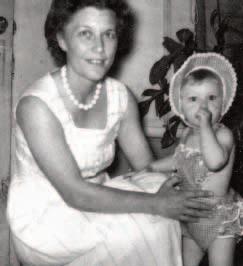
“Even 36 years after her death, others who remember her comment on her kind nature and how much she loved to laugh,” said Mary Tumlin, Betsy Short’s youngest sister and a 1988 graduate of Georgia College. Although she made light of many issues and loved to have fun,
she was always serious about education. I cannot remember her clearly laying down guidelines or expectations for me and my sisters concerning education. We all just knew the expectations. I was never told that I had better do my best in school. I just knew it. I was never told that I was expected to continue my education after high school. I just knew it. I do not remember testing her expectations even once concerning education.”
Short holds four degrees from the university, graduating for the first time in 1981 with a bachelor’s of science degree in early childhood education. Before returning to Milledgeville in 2017 to teach, Short taught in Henry County and served as the assistant principal and principal in Morgan County.
Today, Short is living her dream as a literacy professor at GC where she is teaching future teachers how to teach reading. She does this by teaching her students reading strategies that they can incorporate immediately in their own classrooms.
Short said education is important to her because she believes the more educated someone can be, the more well-rounded and knowledgeable that individual can become. And for current students in the classrooms, Short advises them to focus on their studies and to learn and absorb as much as they can, so that they will be well prepared when they graduate. She also advises students going into education that it is one of the toughest careers, but it is also one of the most rewarding.
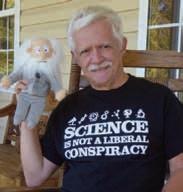 By Emma Parry, ’21
By Emma Parry, ’21
In a cozy office in a home tucked away in the woods outside of Milledgeville, Professor Ken Saladin has just nestled into the cushions of a comfortable couch. He chuckles softly as a fluffy black cat gracefully strikes a pose on top of his lap.
His workspace is serene, much like Saladin’s calm personality. Countless books, which encompass his diverse intellectual interests, are organized neatly, almost scientifically, on his bookshelves.
Saladin is a life-long learner of many disciplines; a true renaissance man. He carries himself with a certain equilibrium that is tranquil and unintimidating to those around him. He is often referred to by those who know him as thoughtful and generous, and a person who wants to better the planet through shared knowledge.
“When you get up to a certain level, you like to reach down and help pull other people up,” said Saladin as he sat on his reading sofa.
Saladin has been an integral part of the longtime dream for an expansion of the honors program at Georgia College. On its 50th anniversary in 2020, the Honors Program will become an Honors College on the level with the College of Arts and Sciences, Health Sciences, Education, and Business.
Instead of simply donating his money to the Honors Program, Saladin figured out a way to make an even bigger impact over the long term. In 2019, he created a donation matching program, wherein he will match any endowed honors student scholarships up to $100,000.
“I think it’s a good way for all donors to magnify the effect of their donations,” Saladin said.
Saladin’s matching program is on track to generate more than $200,000 in scholarship support in less than one year.
“That’s really important for the university and for the Honors Program because it allows us to attract students who might otherwise be tempted to go to a private university, where they have more scholarship support than we do,” said Honors Program Director Steve Elliott-Gower.
During his 40 years of teaching, Saladin, who officially retired in 2017, created multiple honors scholarships. He endowed the William Harvey Chair in Biology to continue a pre-medical mentorship program he began as the pre-med advisor. He also endowed funding to make sure that an annual Medicine and Society Lecture would be a permanent fixture for premedical students.
Saladin does not just give monetarily, though, and not only to GC. Among his many talents, he is an award-winning textbook writer and an advocate for scientific learning and academic advancement.

 By Maggie Waldmann, ’20
By Maggie Waldmann, ’20
Valette Adkins lives in a 200-year-old farmhouse a few miles outside of downtown Milledgeville, Georgia. The only other tenants on her property are a few golden-colored fish who swim in a pond just outside the house.
The vast acreage surrounding the small home gives her something she holds at great value in her life — quiet.
The only thing audible inside of her living room is a wooden grandfather clock that fills the room with ancient chimes at the top of the hour. Her small living space could easily be confused with a side-of-the-road antique store — rustic, nostalgic,
Dr. Barry Darugar can vividly remember the moment that changed the way he thought about his time in Georgia College’s MFA program.
The retired surgeon, who built a successful practice over the course of 36 years, was a nontraditional student, to say the least. He made a decision early on not to attract attention to himself on his drives from Greensboro to Milledgeville: leave the good car, take the pickup.
The tactic had worked seamlessly. But one day, he was asked to escort Robert Bly, who was the creative writing visiting scholar at the time.
“I will admit, I was a little embarrassed to get into that truck,” Darugar said. “He came and sat next to me, but before I could turn it off, on the cassette a Persian song started playing.”
Darugar made moves to turn it off, but Bly quickly told him not to. Bly was touched by the lyrics. Later, Bly, an American poet and essayist, would tell him that he was familiar with Persian culture. They both went on to have discussions about that culture and about Darugar’s own writing.
“He made such an impression on me. He had knowledge of Persian and eastern culture. He brought depth and variety to the program,” he said.
Growing up as a child in Iran, Darugar was a voracious reader. He thrived on translations of works by Ernest Hemingway, Leo Tolstoy, and Viktor Hugo. However, despite his interest for literature and writing, he knew his future was in medicine.
and one-of-a-kind. The kind of place where you are destined to find a hidden gem, which is exactly what she did.
One day, while Adkins went through her late mother, Blanche Green’s, belongings, she happened upon a few items that prompted a fascinating discovery. Inside of her mother’s bedside table was a first edition copy of Flannery O’Connor’s “Wise Blood,” with a written inscription on the cover page.
“For Blanche, regards from Flannery. May 1952.”
Adkins was in possession of items that held value beyond her small farmhouse.
“I didn’t even think about looking for stuff, it just appeared,” she said.
Though the nature of her discovery was unintentional, Adkins knew the items would not serve their purposes sitting on the bedside table. They belonged to the legacy of Flannery O’Connor, which is exactly where they went.
“I was raised in a family with a medical tradition. My grandfather, father, and brother were all doctors — even my two sisters ended up marrying doctors,” he said. “In Iran, becoming a poet is not something a young man can do. It’s not financially secure, and it’s not prestigious or stable enough in the eyes of parents.”
Darugar studied to become a surgeon and eventually settled a practice in middle Georgia's lake area, but the desire to write never left him. After years of writing pieces for the local paper, he wanted more out of literature but also out of himself.
“I realized my own shortcomings in not fully understanding the differences and nuances in the English language,” he said. “I wanted to fully immerse myself in literature.”
An advertisement in the newspaper for the new Georgia College Creative Writing program, helmed by Dr. Martin Lammon, was the turning point for Darugar. He quickly made an appointment with Lammon.
“That gradually got me into it. I think Dr. Lammon realized I was really serious about it,” he said.
After taking several undergraduate courses to become acclimated with being in university again, Darugar took the GRE and entered into the MFA creative writing program.
There, he participated in workshops and began to write, rewrite, and learn when to totally scrap drafts. He made friends through being comfortable enough to critique and make each other’s writing stronger. These connections with fellow graduate students and with visiting scholars are what stay with him today.
“I know that everyone’s time on earth is limited, and I’d like to leave a legacy. I feel I’ve achieved that with my family, helping them succeed to the best of their ability and desire. Now I’d like create something that will enable others to achieve their potential.”
Adkins donated her items in the Fall of 2019 to Georgia College Flannery O’Connor special collection at the Georgia College library, where this legacy, formed by the life and writings of O’Connor, is neatly preserved.
Characterized by an unknowing loyalty to continue this preservation, Adkins’s donation weaves into the colorful tapestry of Milledgeville. A tapestry rich with a remarkable history and even more remarkable people, the people of O’Connor’s stories — the people of the South. Adkins, born and raised in Milledgeville, is one of these people. Though not a character in a bestselling southern novel, she might as well be, as she dedicates her life to maintaining the home of her ancestors.
Darugar created the Dr. and Mrs. Barry Darugar Endowed Scholarship and the Dr. and Mrs. Barry Darugar Endowed Visiting Scholar in the hopes of giving creative writing students a similar experience as he had at Georgia College.
“I want students to have the opportunity and the funds to accomplish their dreams so that they are only limited by their own ambition,” he said.
Darugar also hopes the Endowed Visiting Scholar will enable the creative writing program to continue to bring scholars to campus that have diverse perspectives and share those with budding writers.
“Having international scholars bring their views to Georgia College makes us known across the country but also the world,” he said. “People will realize our university is not just a small, southern college — this is a college with global perspectives.”
Darugar, whose memoir “Out of Iran” was published in 2014, is still hard at work writing. He is currently working on a book of personal essays that revolve around his almost 40 years of intimate interaction with friends and patients during the practice of medicine. And as for his third book, Darugar is taking a departure and writing a book that he said, “will be written under a pseudonym because it’s not something that my middle Georgia, older, religious, Victorian, primarily devoted Church-going types, are going to read.”
But, Darugar said that’s the point of his gifts in the long run — offering opportunity and a chance to hear different views and perspectives.
“It’s not about hearing just one view and thinking that is the truth or that’s the gospel,” he said. “Reading literature and writing… it’s all about opening your eyes to something that you could never expect — that you could never even imagine. I imagine Nabokov experienced something similar when he published ‘Lolita.’ However, I am not brave enough to face that kind of scrutiny.”
We are excited to have completed our capital campaign Follow Your Passion. Find Your Purpose.
Through the generous support of our donors, we were able to accomplish many wonderful things for the university and our students. We look forward to the future succcesses this support will help produce.
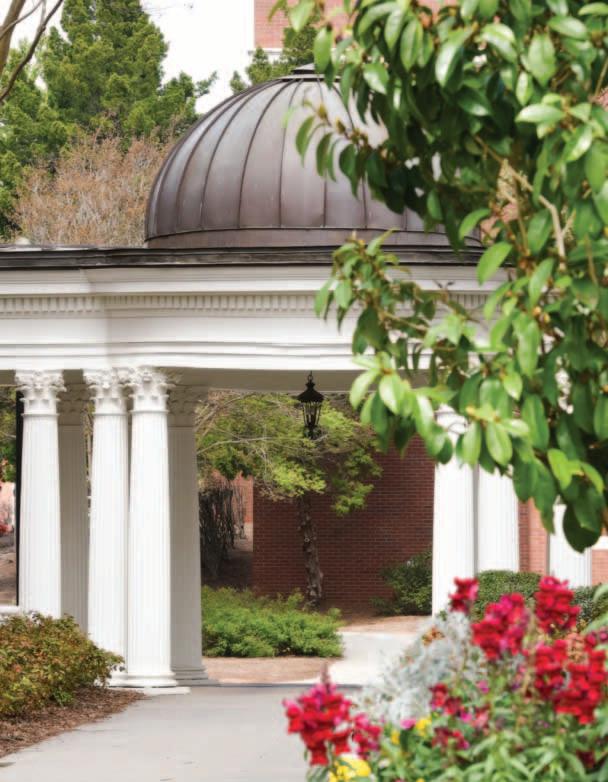
TOTAL AMOUNT RAISED
$30,852,775.95
Number of Gifts: Includes Legacy, Cash, Recurring, and Pledges
Total Donors:
New Donors:
New Endowments:
Includes new endowed scholarships
New Annual Scholarships:
37,581
10,848
5,443
221
61
Each year of the campaign, the number of students awarded scholarships were:
2014-2015: 429 2015-2016: 438 2016-2017: 476
2017-2018: 505 2018-2019: 570 2019-2020: 526*
*Additional scholarships are scheduled to be awarded before the end of the year.
Learn more about the campaign at campaign.gcsu.edu


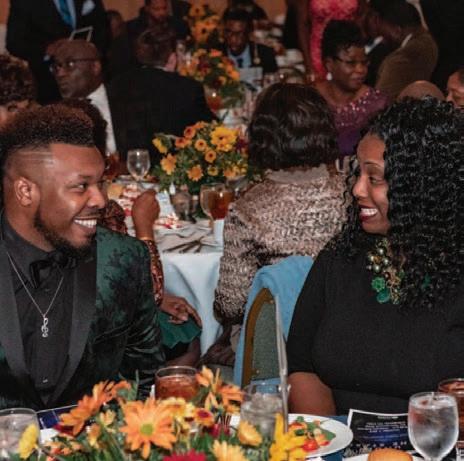

Georgia College alumna Erin Nobles — the mother working to pass “Gracie’s Law” into state legislation granting children with disabilities access to organ transplants — spoke to university nursing students in February in the Health Sciences Building.
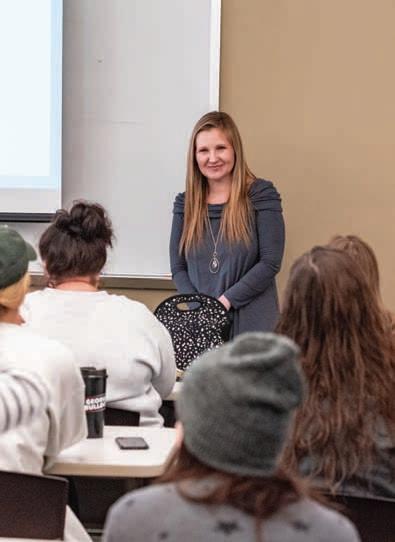

Nobles addressed 54 nursing students in the senior Leadership and Management class. She also presented a WebEx to 12 DNP (Doctorate of Nurse Practitioner) students in the Healthcare Policy, Ethics, and Politics class.
“Students heard Ms. Nobles’ first-hand account of how she used her professional nursing expertise, power, and her love for her daughter to advocate, collaborate, and influence legislators to enact policy change,” said Dr. Carol Sapp, associate professor of nursing.
“As both a nurse and mother, Erin was able to share with expertise how important it is to be an advocate for individuals with disabilities,” Sapp said.
Gracie was born in March 2019 with Down syndrome and spent 17 days in neonatal intensive care. A month later, she showed signs of congestive heart failure and developed serious kidney problems.
At 3-months-old, Gracie underwent surgery to repair a hole in her heart. It was successful. But, if she had required a heart transplant, Gracie could’ve been denied due to her disabilities. Georgia doesn’t have discrimination prevention laws to protect the disabled and ensure equal access to organ transplants. Even states with discrimination laws often leave people and children with disabilities off organ transplant lists.
Nobles received her undergraduate nursing degree in 2006 and her Master of Science in Nursing (MSN) with a focus in Family Nurse Practitioner in 2013 from Georgia College. She works part-time at Jefferson Hospital in Louisville, Georgia.
In January, Nobles was at the state legislature in Atlanta with her husband David, who’s also a Georgia College alumnus with a bachelor’s degree in criminal justice. The Warthen, Georgia, couple attended the state general assembly to see State Reps. Rick Williams (R-Milledgeville) and Mack Jackson (D-Sandersville) formally introduce “Gracie’s Law” to the Georgia House of Representatives. They hoped the bill would pass during the 2020 legislative season.
The Nobles also told their story to a crowd of about 100 people, as part of Georgia Council on Developmental Disabilities Advocacy Day in Atlanta.
“It was life changing. It was amazing,” Nobles said.
Georgia College doctoral nursing students Angie Childre and Kimberly Griffin also went to Atlanta to support Nobles’ cause. The three women have worked together as nurses in the past. Griffin and Childre helped educate legislative officials on the basic rights of all individuals to have access to care.
“I have a passion for access to healthcare for all populations, especially vulnerable populations,” Griffin said. “Individuals with special needs can give organs in the state of Georgia but not receive them in some cases. This is fundamentally wrong.”

Having an alumna like Nobles speak to nursing students provided a first-person account of how professional health care providers can strategize and exercise leadership to help patients, Sapp said.
As Nobles helps her daughter, Gracie, she’s also aiding other people with disabilities and protecting the vulnerable against discrimination.
“This makes a powerful impact on students,” Sapp said, “as they transition to their new role of professional nurse, where they can also make a difference in the lives of others locally, nationally, and globally.”
More students than ever, 15, applied for U.S. Fulbright Scholarships this year, and more than half were named semi-finalists. Nine Fulbright semi-finalists is the largest number in the university’s history.
“These nine students represent the best and brightest at Georgia College, mentored by our amazing faculty and staff. It’s a true testament of their excellence that they’ve been recognized as Fulbright semi-finalists,” said Dr. Costas Spirou, provost and vice president for Academic Affairs.
“We are exceptionally proud of the work they have done while here on our campus,” he said, “and we look forward to seeing the impact they will continue to have on the world through their future endeavors.”
In 2017, four Georgia College students were named semi-finalists. This year, eight undergraduates and one graduate student claim the title. They represent a diverse pool, coming from all colleges at the university.
Fulbright semi-finalists were reviewed by officials in proposed host countries, who selected roughly half to one-third as "finalists" — the Fulbright term for recipients. By May, two students had been announced as finalists: music major Madison Graham of Louisville, Georgia, who got an English Teaching Assistantship to the Czech Republic, and Amara Tennessee of Roswell, Georgia, who has double majors in public health and world languages. Tennessee received an English Teaching Assistantship to Columbia.
Selection for the Fulbright U.S. Student Program is rigorous. The organization receives about 12,000 applications a year. In the U.S., about 1,900 grants are awarded annually in all fields of study and over 140 countries. More than 360,000 Fulbright recipients have participated in the program since its inception in 1946.
“Is nine unusual? Yes,” said Anna Whiteside, assistant director of the Honors Program and coordinator of the National Scholarships Office at Georgia College. “To have over half be successful — we have never had that percentage of our applicants make it to the semi-finalist stage. So, that is a huge improvement for us as a university.”
“As a smaller university — in particular a public university that is fairly new to having students apply to Fulbright — having nine semi-finalists is a pretty significant number,” she said.
Other semi-finalists included majors in education, English, chemistry, mathematics, management, theatre, psychology, and sociology.
Whiteside begins talking to students about the U.S. Fulbright and other national scholarships during their freshman year. It takes several months to a year to get an application ready. She helps students navigate Fulbright’s different programs and keeps them informed of deadlines and informational webinars.
Whiteside also helps students improve their personal essays by reading multiple drafts and making suggestions for added details and striking the right tone. Then, she and a group of Georgia College professors conduct scholarship interviews. These interviews can be intense with difficult questions, but they help students clarify goals and vision.
“I’d like to think that, after they finish the process, not only are they feeling more confident about themselves, in general, but also about their ability to put together any kind of application moving forward,” Whiteside said. “A big part of what I do and what faculty do is help students see the reality of what they’ve accomplished.”
In May, Amara Tennessee and Madison Graham were named Fulbright finalists, with Laura Swarner being named an alternate. Visit https://frontpage.gcsu.edu to learn more about their Fulbright plans.
| 16 | alumni.gcsu.edu




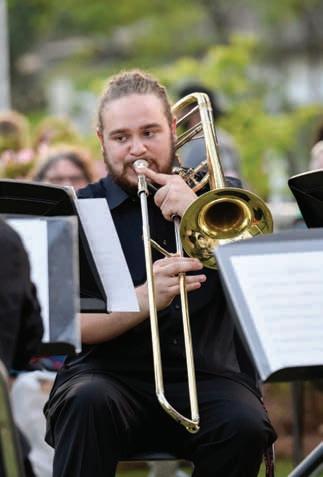

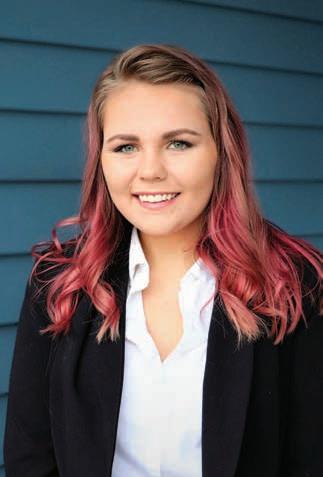

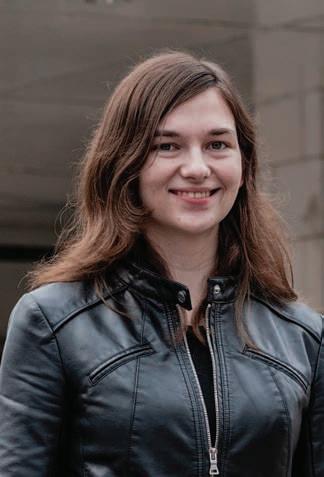
Georgia College Graduate: 2008, BSN
MSN Family Nurse Practitioner, 2014


Current role: Inverventional Radiology/Vascular Specialty Nurse Practitioner, Aventura, FL

“ For me, it has been a blessing that since 2008 my career and passion came together in my life. I love to be around people and help them in any way I can.”
Georgia College Graduate: 2016, BSN
Current role: Registered nurse at Grandview Medical Center, Birmingham, AL
“ As a nurse, I feel blessed to be able to help and provide the best care for patients and their families in such a difficult time. I am beyond encouraged by my coworkers, other health care providers, and those who help provide care during this pandemic. I’m honored to be able to provide help in any and every way possible to those in need.”
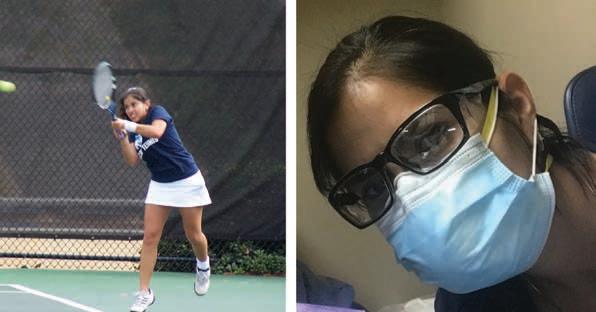

Georgia College Graduate: 2009, Psychology
Current role: Law enforcement/Detective at the Baldwin County Sheriff’s Office, Milledgeville, GA
“A lot has changed since I got into law enforcement 10 years ago, but one thing has and will always remain is the fight to protect our community and never failing to answer the call! Much like what we are facing today in this health crisis, we have to come together as one community to protect ourselves and the ones around us, and we will get through anything that comes our way!”

Georgia College Graduate: 2018, BSN
Current role: Emergency room nurse at Piedmont Henry Hospital, Stockbridge, GA
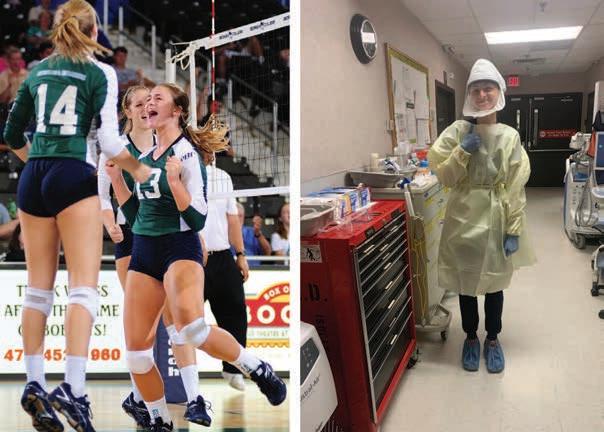
“The teamwork and leadership qualities I gained at Georgia College have helped me become a great team player in the Emergency Room with my colleagues. A lot of the time we are in high-pressure situations, and it helps to create a smooth environment amongst the chaos.”
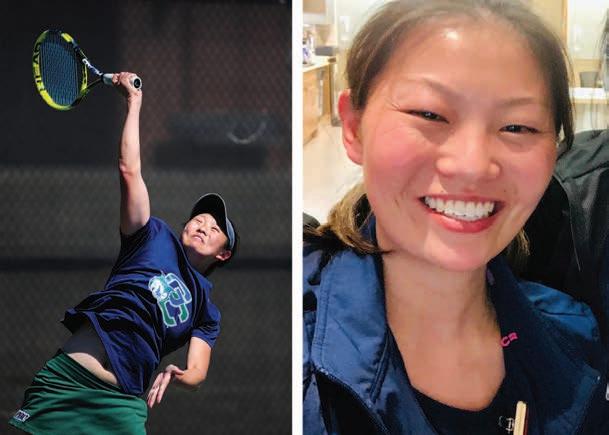
Georgia College Graduate: 2017, BSN
Current role: Intensive Care Unit registered nurse at WellStar Kennestone Hospital, Marietta, GA

“I wanted a career where I could serve others in my community, and now I get the opportunity to do that every day.”
Georgia College Graduate: 2017, BSN
Current role: Emergency room nurse at St. Joseph’s Candler Hospital, Savannah, GA
“Being a nurse is the best, hardest, most rewarding job in the world to me. Even after the longest nights, I wouldn’t trade it for anything and I’m so thankful to Georgia College for preparing me for my dream job!”
Georgia College Graduate: 2018, BSN
Current role: Registered nurse, Cardiovascular Care Center at University Hospital, Augusta, GA
“My job is to prep and recover patients for cardiac procedures (cardiac caths, permanent pacemakers, ablations, cardioversions, etc.). But I have recently been working on the COVID unit at my hospital since they have needed extra help during the pandemic.”
Georgia College Graduate: 2016, Exercise Science

Current role: Physical Therapist, spcializing in Sports Medicine at the Institute for Athletic Medicine (M Health Fairview Clinic), Baline, MN
“Attending Georgia College was one of the best decisions I have ever made. Not only was I able to play soccer at the collegiate level with a team that became family, the Exercise Science program provided me with a strong foundation that has allowed me to excel at the start of my physical therapy career. This combination of athletic and academic experience inspired me to pursue further specialization in sports medicine. I could not be more thankful for all of the leadership skills, knowledge, and memories I gained that will follow me for a lifetime. FOREVER A BOBCAT!”


Georgia College Graduate: 2018, BSN
Current role: Pediatric registered nurse at Norton Children’s Hosptial, Louisville, Kentucky
“Being a nurse is something I’ve always wanted. Helping people, especially kids, is a passion of mine. I know this is exactly where I am supposed to be, especially at this very difficult and unprecedented time. Helping children get through possibly the scariest part of their life is exactly where God has called me to be.”


Georgia College Graduate: 2013, BSN
Current role: Nurse Practitioner, Orthopedic Trauma Surgery at Vidant Medical Center, Greenville, NC
“I typically meet my patients on one of the worst days of their life. They are usually scared, confused, and in pain. To be able to share their journey from day one, all the way through recovery, is so special. It’s what keeps me inspired and energized to be a better provider every day.”
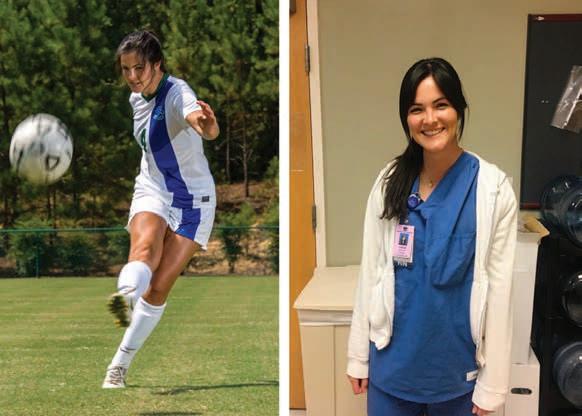
Georgia College Graduate: 2016, BSN
Current role: Labor and Delivery Nurse at Northside Hospital, Atlanta, GA

“I’m am so thankful I get to care for moms and babies during the precious and trying moments of labor and birth.”

Georgia College Graduate: 2009, BSN
Current role: Emergency room nurse at St. Mary’s Hospital, Athens, GA
“My time at Georgia College will always hold a special place in my heart. From playing basketball, scoring over 1,000 points, pursuing my calling as a nurse, meeting my husband Wes, and making memories that will last a lifetime. We will forever have Bobcat Pride!”
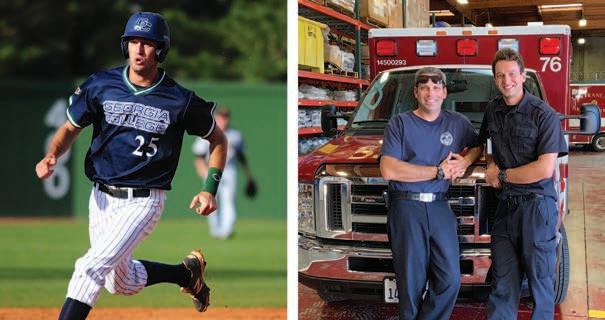
Georgia College Graduate: 2016, Psychology
Current role: Physician Assistant and paramedic for the American Medical Response, San Francisco, CA
“Life is too short to waste time on things that don’t make you happy.”

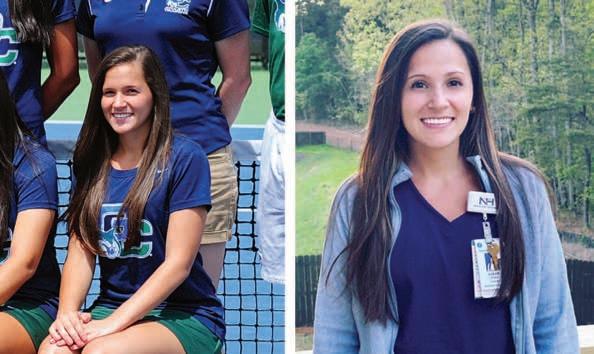
Georgia College Graduate: 2015, BSN
Current role: Physician Assistant in the APP Surgical Fellowship with UCHealth at Anschutz Medical Campus (Denver, CO) and Medical Center of the Rockies (Loveland, CO)
“I am humbled and honored to be a part of a profession that aids in collaborative care and teamwork to bring about more compassionate care for our patients.”
Georgia College Graduate: 2016, BSN
Current role: Registered nurse at Northside Hospital, Forsyth, GA
“I am forever thankful for Georgia College for not only giving me a sense of community, lifelong friendships, and unforgettable memories, but also for preparing me for real-world experiences as a registered nurse. Nursing has given me a sense of purpose and has allowed me to serve my community during this challenging time.”
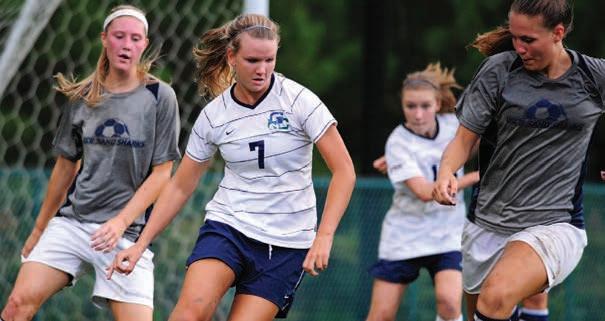
Georgia College Graduate: 2014, BSN
Current role: Intensive Care Unit registered nurse at Northside Hospital, Atlanta, GA



Georgia College Graduate: 2016, BSN
Current role: Registered nurse at Peyton Anderson Neonatal Intensive Care Unit, Macon, GA

“My four years at GC were nothing short of amazing! Getting to spend four years playing the game you love with some of the best people I’ve ever met is something I’ll forever be grateful for. GC is the best, and I recommend it anytime I get the chance! The campus, atmosphere, and the people are like no other. It’s not too big, yet not too small! Go bobcats, forever!”


Georgia College Graduate: 2017, BSN
Current role: Registered nurse, Emory Heart & Vascular Center at St. Joseph’s Hospital, Atlanta, GA
“I found my purpose through my passion; to help patients believe that miracles do indeed happen.”
Georgia College Graduate: 2016, BSN
Current role: Neonatal Intensive Care Unit registered nurse at Northeast Georgia Medical Center, Gainesville, GA
“I am thankful that God has allowed me the opportunity to care for the neonatal population. I couldn’t imagine doing anything else, and it is my hope and prayer every day I go to work that I am able to be a light and encouragement to my tiny patients and their families through one of the most difficult times in their lives.”
Georgia College Graduate: 2014, BSN
Current role: Neonatal Intensive Care Unit registered nurse at Northside Hosptial, Atlanta, GA
“I work with preemies from 22 weeks gestation to full term. I love working with these babies. They’re born so small but are so resilient.”

Junior Kendyl Lewis’s heart lies in public service. She started an organization on campus to help students with food insecurity and champions that in all her other activities.
Her work addressing food insecurities began in high school and grew as she started college.
“I came into Georgia College with a desire to make a lasting impact on the school and the Milledgeville community, so I actively sought out a need in the community that was not currently being met,” said Lewis.
She found Georgia College had no organization focused on student food insecurity, so she worked to meet that need by starting her own to not only raise awareness, but also provide aid to students who struggle with hunger.
“Since I first came up with the idea for Swipe Out Hunger, I have become more and more passionate about combating food insecurity because food is universal,” she said. “It is a basic necessity, but food also unites people and brings such joy into people's lives. I have made it my life's mission to share the gift of food with as many people as I possibly can.”
It’s that passion and work that led her to be named a Truman Scholarship finalist in early spring. More than 770 students applied for the scholarship named in honor of President Harry Truman. Lewis was one of 190 finalists who participated in an in-person interview — one of only four finalists for the state of Georgia. Although not one of the scholarship awardees, Lewis’s work continues to make an impact.
“Kendyl's long track record of working to combat food insecurity by leading important efforts on campus — like Swipe Out Hunger — and also by serving as a Zero Hunger Intern in Washington D.C., have demonstrated that she is going to truly be someone who changes the way that this country works to feed all of its citizens,” said Anna Whiteside, assistant director of the Honors Program and National Scholarships coordinator.
In the classroom, Lewis focuses on her double majors in psychology and economics as well as developing her leadership skills. She completed all leadership programs offered at Georgia College — the Emerging Leaders Program, Leadership Certificate Program, and the Georgia Education Mentorship (GEM) program.
“The leadership classes pushed me to think about how I can use my skills to make the world a better place. The GEM program has shown me what I can do with my leadership skills when I graduate,” said Lewis.
Also a member of the Honors Program, Lewis said it allowed her to grow academically as she was encouraged by professors to be the best she could be.
“I have done multiple Honors Option projects on food insecurity, and I am thankful that my professors have let me tie my passion to their class material,” said Lewis.
This summer, she’ll continue working on food insecurity research, which she started as an Honors Option.
“I am researching how social safety net programs, such as SNAP, impact food insecurity rates in the United States,” said Lewis. “This paper will be my senior capstone project for my economics major.”
When she’s not in class or combating hunger, Lewis can be found conducting campus tours in her role as a student ambassador.
“It allowed me to share my love for GC with prospective students and guests,” she said. “I love that I can potentially impact a student's college experience by sharing with them all of the wonderful opportunities I have taken advantage of at GC.”
By sharing her experiences and what the university can offer, she hopes she can help ignite a passion and be a source of encouragement for others — something she’s grateful to have had throughout her time at Georgia College.
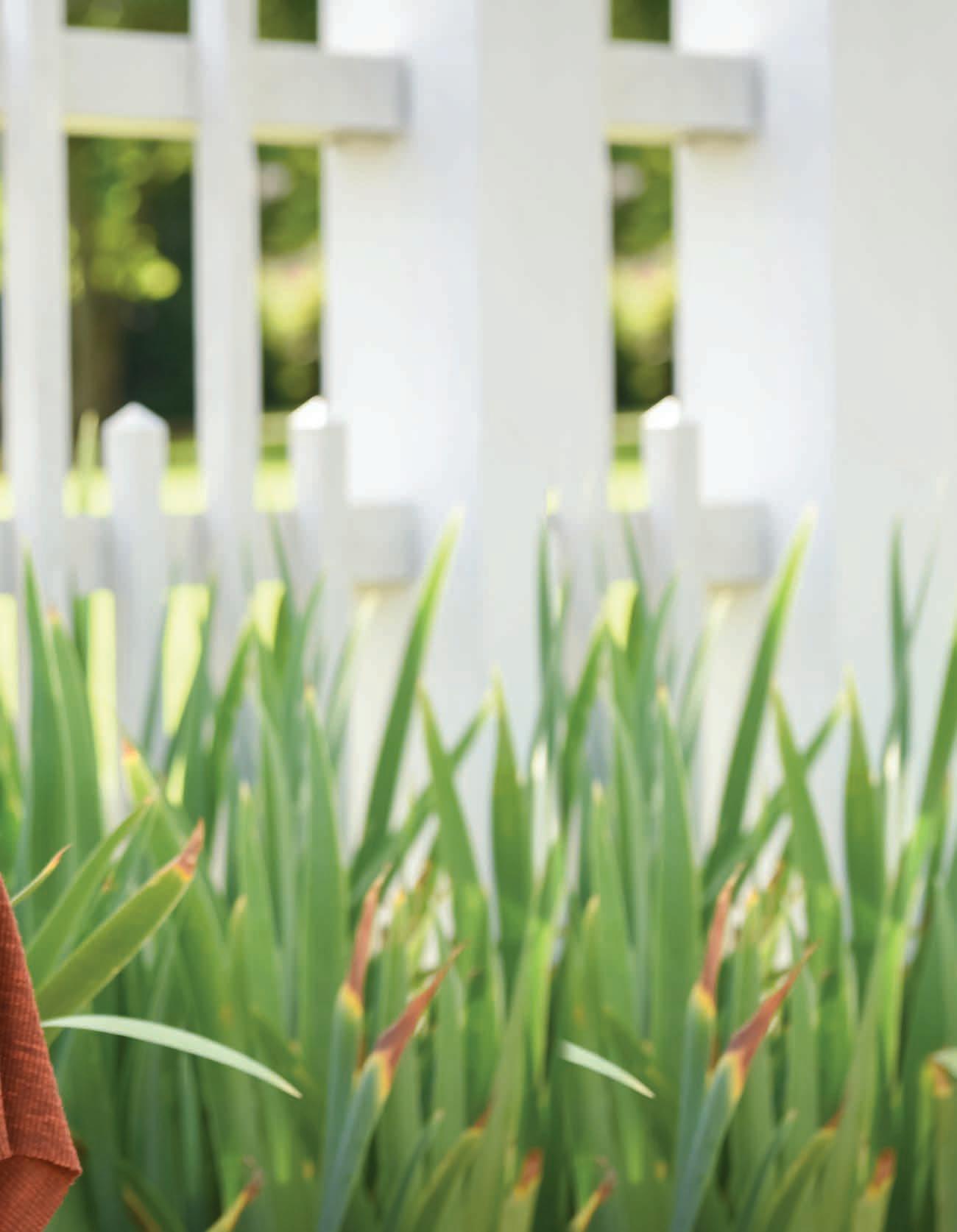
Since coming to Georgia College in 2015, Assistant Professor of Music Dr. Dana Gorzelany-Mostak has instilled many transferrable skills in students through her teaching, scholarship, and powerful zeal for music. With her leadership, she crafted extensive learning opportunities students can take with them to use in their chosen careers.


“Part of my goal in teaching is to find out what students’ interests are, and then really harness them in a way that allows the student to reach some sort of goal, whether that’s publishing a research project or planning a concert,” she said.
Mostak teaches several music history classes and directs the women’s ensemble and the music theatre scenes class. As founder and co-editor of Trax on the Trail — a website research project, cataloguing the soundscapes of U.S. presidential campaigns — she provides students with skills in music and beyond.
Since 2015, Trax on the Trail has produced seven research assistants and two media interns at Georgia College. The team also includes scholars from universities across the country. Her students have assisted with the design and development of the
2016 and 2020 campaign music databases.
Mostak and her team document campaign music on sites like Twitter, Instagram, and YouTube, as well as music that’s performed in live contexts like rallies or fundraisers.
Her students gain transferrable skills conducting original research, presenting at conferences, and publishing in scholarly journals. One student gave a poster presentation at the recent Undergraduate Research Conference on the challenge of political candidates campaigning amid social distancing requirements due to COVID-19.
“Whether our students decide to go on and do something in marketing, communications, event planning, or nonprofit work, all of these different skills that they’re acquiring can help them in many different fields,” Mostak said. “They complement what the students are already doing.”
Other projects she organized include “Journeys and Pathways” in 2019. This concert was held as part of a conference at GC called, “Tackling the Refugee Crisis.” It featured students and faculty performing the music of composers who identify as refugees.
In 2017, she organized the Antebellum Song Project where student singers learned about women’s musical culture through immersive activities. These included the performance of 19th-century parlor songs, a comparative study of etiquette manuals, creative writing activities inspired by 19th-century lady’s magazines, and the reconstruction of historic recipes.
Mostak appreciates the many individuals at Georgia College who’ve supported her programs.
“I was only here three weeks in 2015, when my former department chair and the former dean of Arts and Sciences helped me get two research grants, so I could launch the Trax
on the Trail website,” she said. “They barely knew me, but believed in my project and invested in it.”
She’s grateful for these opportunities and wants to help students grasp their strengths.
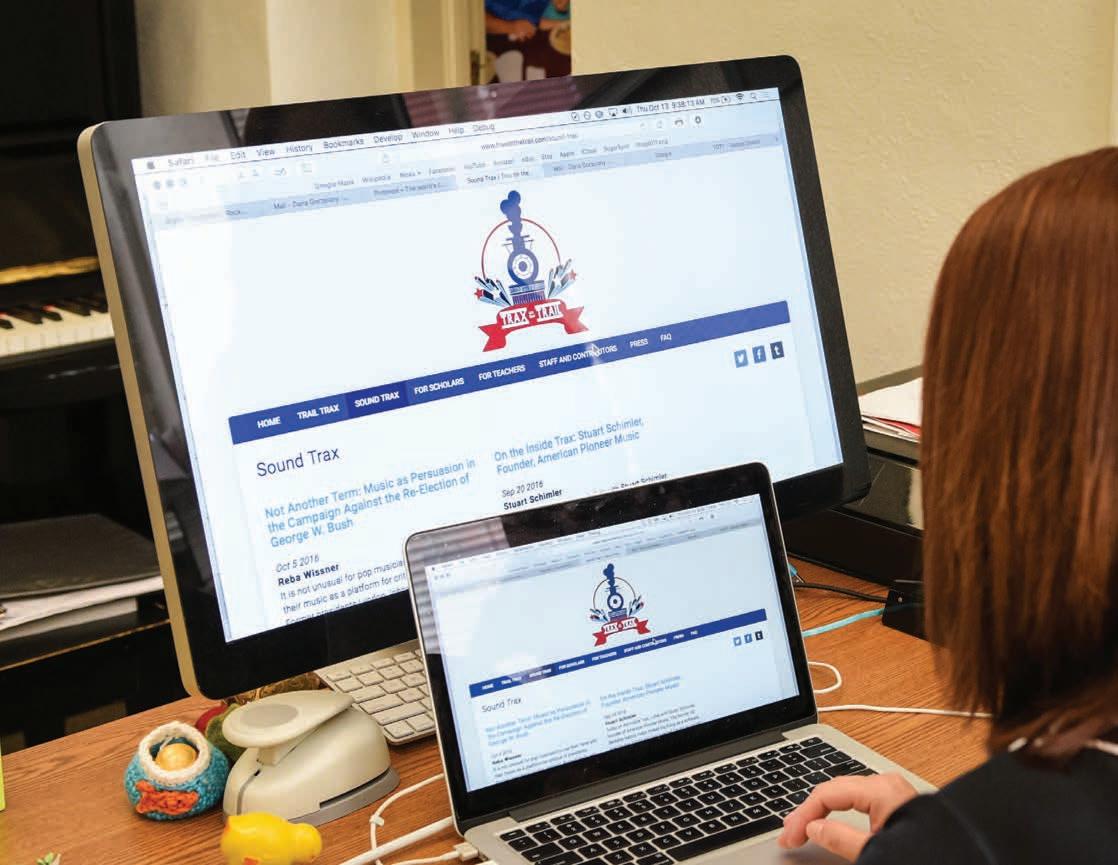
“It may seem like a lot of these things are random and are disconnected. But, in a lot of ways, they are connected,” Mostak said. “I can see what my interests and activities are now, and I can look backwards and see where those interests first crystallized. Georgia College has allowed me to realize all these different sides to myself. And I think, in a way, we nurture the same among our students.”
Between the students and music, she has the best of both worlds.
“Every day I get to stand up in front of students and talk about something that I’m super passionate about,” Mostak said. “I can’t imagine it getting any better than that.”





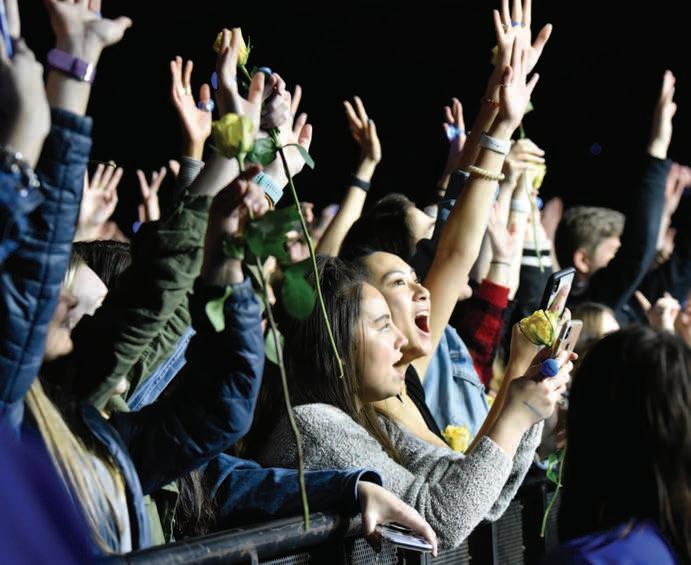



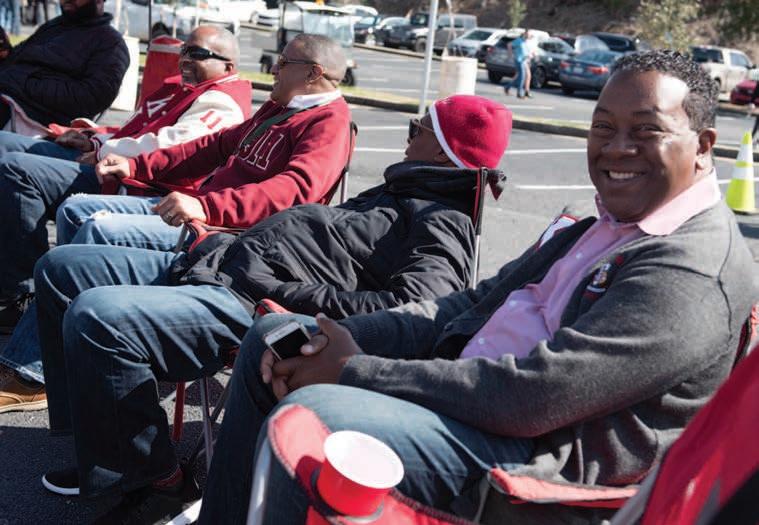

The 35 TH annual international dinner
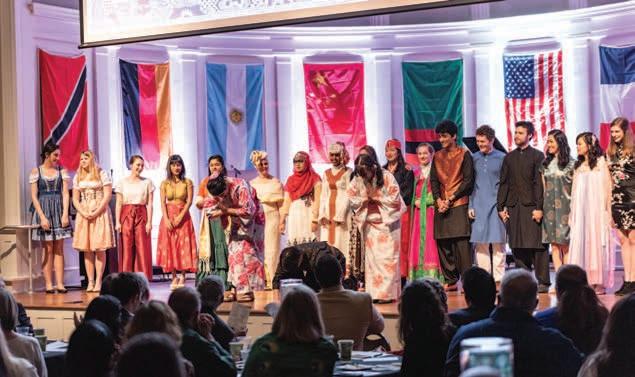


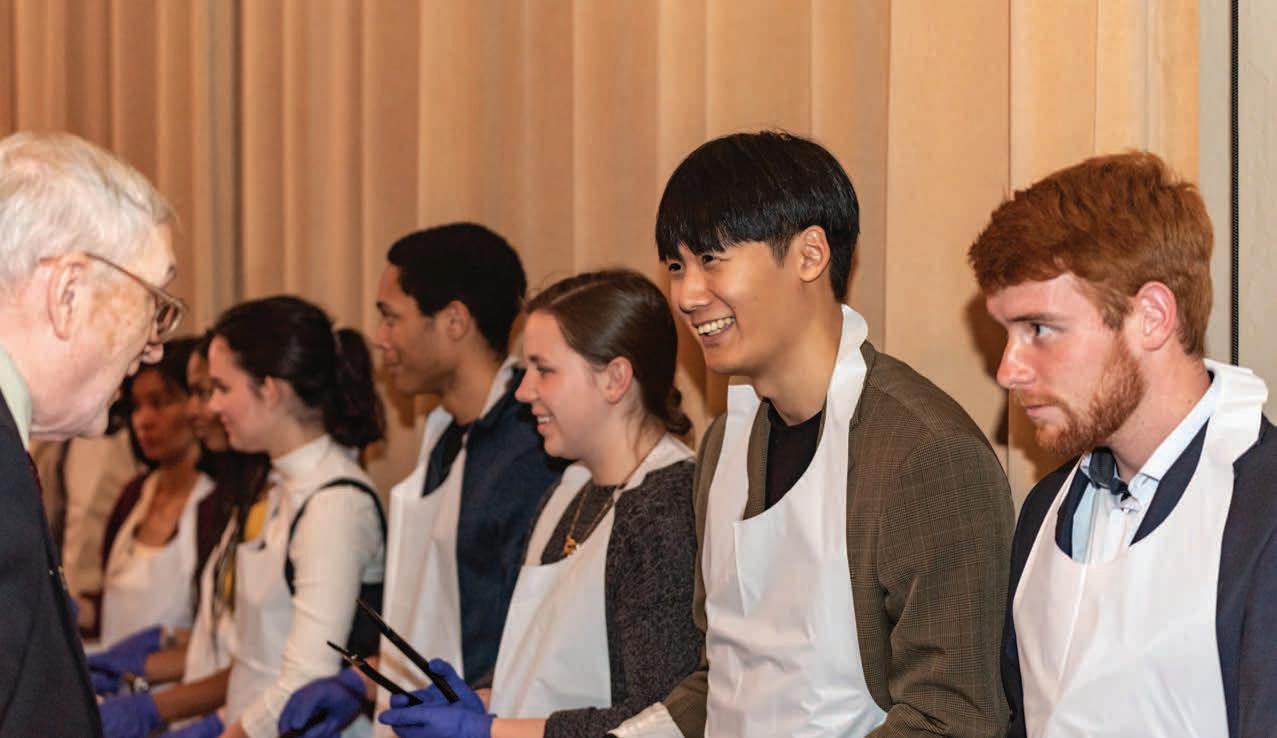
Nancy Campbell Curry, ’69, ’72, and her husband, Dan, have been married 44 years and have two daughters, two sons-in-law, and four grandchildren. She has been retired from teaching in Gwinnett County Schools for 11 years. The couple spends much of their time playing with their grandchildren, working in several church and civic groups, and sitting on the beach.
Richard Hughes, ’91, successfully passed the Georgia Real Estate exam in September 2019, and is a licensed realtor in the state working for Rivoli Realty in Macon, Georgia.

Andrea Smith, ’00, became president of the Junior League of Atlanta, Inc. Board of Directors for the 2019-2020 league year.


Julie Rutland Conner, ’92, ’94, was named the Tift County High School Teacher of the Year for 2019. She teaches health and wellness and adapted physical education at her Alma Mater Tift County High School. She is also the head girls’ basketball coach. She played basketball at Georgia College as a Colonial, and then went on to be assistant coach and the head men's and women's cross-country coach at Georgia College. She was married to her college sweetheart Tom Conner, ’93, who passed away in 2018.
Patricia “Patti” Hill, ’96, ’08, recently graduated with her Doctor of Nursing Practice (DNP) from Georgia State University in May 2019. During her time at Georgia State, she earned the Army Nurse Corps Scholarship and the Georgia State University Alumni Association Scholarship in 2018. Her topic for her DNP project was “Obstructive Sleep Apnea in Women.” She has been working as a family nurse practitioner at North Macon Family Healthcare Associates in Macon, Georgia, since 2010.

Amie McCaleb, ’99, married Jeremiah Schaff April 6, 2019, at Camp Kiwanis in Danielsville, Georgia. Alumni in attendance were Jill Davis Towns, ’98, Payton Towns, ’98, and Jakie Hogan, ’97. The couple resides in Loganville, Georgia, with their dog Bongo.

Danielle Wood Fields, ’04, ’17, was recently elected as the national vice president of Junior Chamber International (JCI) USA during the corporation’s annual meeting in Corpus Christi, Texas. Fields was elected as the national vice president of partnerships. She is assigned to eight states. As the founding president of the Milledgeville Jaycees in 2014, Fields served in numerous state and local leadership roles. She was also elected state president of the Georgia Jaycees in 2019, where she focused on providing development opportunities for members statewide, building a network within the state chapters, and increasing membership while adding chapters. She is excited to serve the organization in her new position and looks forward to sharing her experience with JCI members across the nation.
Elizabeth Bender, ’06, ’08, has entered her eighth year as district librarian for the Kodiak Island Borough School District in Kodiak, Alaska. She served two years in Delta Junction, Alaska, as the middle and high school librarian. Bender continues to be involved in community theater activities.

Brandon Lee, ’06, ’09, was selected to participate in the Defense Department Development Program. This program selected three senior-level U.S. Army Engineering and Support Center acquisition professionals for an 18-month-long Department of Defense executive level program designed to hone leadership competencies for managerial and executivelevel performance. Lee has worked for the Department of Defense since 2009. He resides in Huntsville, Alabama, with his wife Melissa Lee, ’06, ’07, and their two children, Landon and Madison.

Jason Hendrix, ’09, and his wife, Rosilyn, welcomed their first child, Micah Nolan Hendrix, Aug. 2, 2019, at 2:33 a.m. at Tallahassee Memorial Healthcare in Tallahassee, Florida. Micah was born measuring 19.5 inches and weighing seven pounds, seven ounces.
Hendrix was a cross country studentathlete during his time at Georgia College, served as the founder and first Thunder — the Bobcat mascot from 2007-2009, and was the recipient the 2018 Outstanding Recent Alumni Award.
Deitrah Taylor, ’09, wrote her first play titled “Soul Town: The Black Music Movement,” in collaboration with Dr. Shelton Land, which was performed at the Atlanta Black Theatre Festival Oct. 4, 2019. The production centers on the role of women in the Black Arts Movement and the Civil Rights Movement. She has served as a dramaturge and assisted students and faculty with productions at Georgia College including Barbecue (2019), Crowns (2019), and Detroit '67 (2017).
Leodanny “Leo” Garcia, ’10, is completing Air Command and Staff College at Maxwell Air Force Base in Montgomery, Alabama. He and his wife, Mary, ’10, and their two girls are looking forward to returning to the Washington, D.C. area this summer for a Pentagon tour.


Karlee Corrado, ’11 ’15, married Kyle Kelly, ’15, in Roswell, Georgia, Oct. 13, 2018. The couple met the first day of class freshman year at GC. They got engaged on Front Campus after graduation. Fellow Bobcats of the wedding party included Kaitlin Denhart, ’15, Kayla Higdon, Lynsey Mosley, ’15, Erik Dunn, ’15, Drew Jones, ’14, Joseph Hanson, ’13, Mathew Turrie, ’15, Jake Morris, ’13, Mollie Millsaps Chafin, ’16, and Nolan Klinke, ’14.

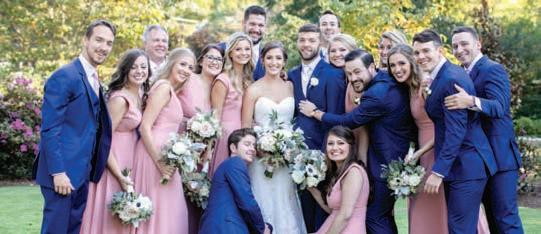

Hannah Calloway Harlan, ’11, and her husband, David, welcomed their first child, Clayton David Harlan, March 23, 2019. He weighed nine pounds and 10 ounces and was 21 inches long.



Stephanie Jergel Holtzapfel, ’10, and her husband, Andrew, welcomed their daughter and first-born, Reagan Holtzapfel, into the world July 26, 2019.
Daniel Brown, ’12, recently accepted a position as chief building inspector and director of Building Services for Monroe County, Georgia. He credits his time at Georgia College for enabling him to not only understand the historic value of building preservation, but also being able to problem solve and work with diverse groups to come to solutions that benefit each party. He feels that the lessons he has learned at Georgia College are part of the reason he’s become one of the youngest directors in this field within the state.
Emily McCollum, ’12, and Austin Healey eloped May 4, 2019, at Mount Mitchell, North Carolina. The bride is a marketing graduate of Georgia College while the groom graduated in 2013 from Saint Leo University's Psychology program. The couple celebrated their marriage with family and friends at receptions in North Georgia and the groom's hometown of Cincinnati, Ohio.
Emily Willis, ’12, was hired to write a fiveissue mini-series for the licensed property of Over the Garden Wall for BOOM! Studios. The mini-series, titled “Over the Garden Wall: Soulful Symphonies,” was just published.
Jennifer Hawe Joshi, ’12, ’16, received her B.S. in exercise science. Shortly after gaining some health care experience, she went on to pursue her master’s in health promotion. During grad school, Jennifer married her best friend, Sid Joshi. She pioneered an internship at Emory University’s Faculty Staff Assistance Program and also worked at Resurgens Orthopedics as a durable medical equipment coordinator during her graduate studies. Jennifer went on to pursue her prelicensure master of science in nursing clinical nurse leader degree from Augusta University and graduated in December 2018. She is a registered nurse and an outpatient nurse in the Gwinnett area.
Sarah Wierzbowski Kramer, ’12, ’13, and her husband, Michael, welcomed their first son, Liam Walter Kramer, June 5, 2019.


Victoria White, ’14, married Benjamin Thompson ’14, Nov. 16, 2018, at Cold Creek Farm in Dawsonville, Georgia. Victoria and Benjamin met as freshmen at Napier Hall in August 2010. Victoria graduated with a Bachelor of Science degree in biology. She has worked at the Florida Fish and Wildlife Conservation Commission and now works for Lockheed Martin. Benjamin graduated with a Bachelor of Science degree in physics and a master’s degree from Florida State University in mechanical engineering. He works for Lockheed Martin. The couple resides in Florida and looks forward to visiting Georgia College again for alumni events.





Maggie Wilson Griffin, ’15, married Xander Griffin June 29, 2019 at Koury Farms in Auburn, Georgia. She met all of her bridesmaids at Georgia College.

Erica Perkins Hilliard, ’13, and Matthew Hilliard, ’14, met at Georgia College their second day of classes and married January 2015. The couple resides in Opelika, Alabama, with two children: Addison, age three, and Jackson, age seven months. Matthew just graduated with his Ph.D. in Chemical Engineering from Auburn University. He is working on patenting a piece of his technology and opening his own business. Erica works at Regional Rehabilitation Hospital as a certified rehabilitation registered nurse rehab liaison.

Jennifer Jensen Singh, ’13, ’14, is a teacher and started her graphic design business, where she was commissioned by Princeton University for her design work. Also, some of her work is for sale in the gift shop at the National Museum of Women in the Arts in Washington, D.C. She married Lake Singh in July 2019. The couple resides in Centreville, Virginia.
Melissa “Missy” Perez Payne, ’14, and Douglas Payne, ’13, announce the birth of their daughter, Grace Dorothy Payne. Douglas and Missy met while attending Georgia College.

Kaleb Holbrook, ’15, and Chloe Beacham, ’16, were engaged Nov. 2, 2019. After graduating from Georgia College, the high school sweethearts moved to Atlanta to begin their careers. Beacham received her BS in psychology and is a Ph.D. student in school psychology. Holbrook graduated with a bachelor’s in business administration and is a project manager at Georgia Power Company. They have a dog named Lumen, who is their pride and joy. The wedding is planned for April 2021.
Taylor Rucker Watson, ’15, ’17, and Chad Watson, ’17, celebrated their one-year wedding anniversary in February. They got engaged shortly after graduation.
Abby Robbins, ’14, and Taylor Robbins, ’15, welcomed Jackson Ray Robbins into the world at 1:55 p.m. Feb. 17, 2020.

Joshua Akins, ’18, pictured in the center, was one of 26 new members who were selected as a member of the Emerging 100 of Atlanta. Founded in 2010, the Emerging 100 of Atlanta, a young professional auxiliary of the 100 Black Men of Atlanta, Inc., is comprised of members representing an array of professional industries. Every new class of the organization is tasked with funding and performing a service project as their first order of official business. On Jan. 20, the 26 new members celebrated Martin Luther King, Jr. Day by serving at Gateway Center’s Evolution Center for men experiencing homelessness.

Akins has worked as an associate II at Draffin Tucker, LLP in Atlanta since 2018.
Mary Beth Hall Pennington, ’18, married Colby Pennington, ’15, Sept. 22, 2019. The couple wed in the bride's hometown of Watkinsville, Georgia, and now resides in the groom's hometown of Milledgeville, Georgia. Mary Beth received a B.S. in Outdoor Education and Colby graduated with a B.S. in Nursing. Mary Beth works in the Office of Admissions at Georgia College. Colby works as a registered nurse in Milledgeville. Nine members of the bridal party are proud Georgia College alumni.


Carolyn “Cari” McDuffie, ’18, accepted the position of Main Street coordinator for the Dahlonega Downtown Development Authority and Main Street Program immediately after her graduation. Downtown Dahlonega is one of the nation’s foremost historic downtown centers and is a winner of the National Main Street Center’s Great American Main Street Award and the Georgia Downtown Association’s Award for Excellence in Downtown Development. The Dahlonega Main Street Program uses investment incentives to facilitate the use of basements, upper floors, outdoor plazas, and underutilized spaces for residential development and new or expanding commercial construction.
Graycen Dominy Guilshan, ’18, received her nursing degree in December 2018, and her husband William Guilshan, ’19, finished with a degree in marketing. They met at Georgia College in 2015 and quickly began dating. They married in Madison, Georgia, June 22, 2019, surrounded by family and friends — most of whom they met at Georgia College. The couple settled in Atlanta. Graycen is a nurse at Children's Healthcare of Atlanta, and William works as a branch administrator for Russell Landscaping.

as a graduate assistant for University of South Carolina International Student Services, where he assists with campus programming and educating students about different cultures.
Please submit

Emily Drake Crawford, ’22
Catherine Cline Farmer, ’26
Ima Williams Speights, ’26
Lillian Griffin Atkins, ’27
Beatrice Howard Farmer, ’30
Helen Carrigan Hardie, ’33
Frances Jones Tharpe, ’34
Mildred Hortense Burch, ’36
Rebecca Bush Whittle, ’36
Sara Doster Jacobs, ’37
Lautrelle Prince Love, ’38
Edna Harrell Batchelor, ’39
Helen Boyett, ’39
Macie Jacobs Colvin, ’39
Elizabeth Lott Dawson, ’39
Nancy Heard, ’39
Dorothy Nelson Pinkstaff, ’39
Martha Stephens Wheeler, ’39
Catherine Holloway Bruce, ’40
Joyce Mickle Long, ’40
Frances Bennett Bozeman, ’41
Marjorie Bloodworth Clark, ’41
Lorraine Proctor Davis, ’41
Jane Trapnell Stanton, ’41
Hilda Blackstock Tonge, ’41
Carolyn Hilyer Knight, ’42
Allene Shaw Merriman, ’42
Carolyn Swindle Monroe, ’42
Florence Finney Easterlin, ’44
Emily Jenkins Swingle, ’44
Frances Way Parriott, ’46
Carolyn Crow Butler, ’47
Betty McMillin Boyer, ’48*
Gwendolyn Wilson Collier, ’48
Betty Cox Gill, ’48*
Martha Davis Heldenfels, ’48
Carolyn Rozier Sims, ’48
Berta Godwin Stewart, ’48
Edwina Pierson Banks, ’49
Ruth Hill Ciraldo, ’49
Joanne Pierce Drake, ’49
Lorene Reagin Shaw, ’49
Jean Haulbrook Taylor, ’49
Jo Ann Morris Taylor, ’50
Nancy Hicks Elliott, ’51
Mary Carter Evans, ’51
Yvonne Wright Bivins, ’52
Edith Ellington Grimsley, ’52
SuEllen Holliman James, ’52
Carolyn Wood McRea, ’52
Betty Stewart Quinn, ’52
Jeannette Jones McClure, ’53
Lyndoll Ulm Moore, ’53*
Patricia Morris Scott, ’53
Vara Casteel Cox, ’54
Sarah Dryden Marks, ’54
Mariuna Morrison, ’54
Rose Thornton Willis, ’54
Wanda Highsmith Bennett, ’55
Myra Martin Willis, ’55
Eugenia Crook Carpenter, ’57
Katurah Grant Kelly, ’57
Margie Foy Martin, ’57
Mildred Barrett West, ’57
Carolyn Rainey Bridgman, ’58
Lavenia Grimsley Kimbell, ’58
Anne Reddick-Mitchum, ’58
Margaret Carter Crawford, ’59
Crystal Ridgeway Dunahoo, ’62
Mary Eason Evans, ’64
Carolyne Hammond Guitton, ’64
Mattie Morrison Proctor, ’64
Aileen Connor, ’65
Beverly Young Wallace, ’69
Gloria Blount Winston, ’70
Candace Cebula Kitchens, ’71
David Hawley, ’72
Donald Belflower, ’74
Linda Abbott Hargrove, ’75
Beverly Williamson MCullough, ’75
Robert Donaldson, ’77
Brenda Brown Tutt, ’77
John Cox, ’78
Benny Harris, ’78
Dianne Weiss Bayne, ’80
James Burnes, ’82
Mary-Louise Gartung Dove, ’82
Melba Orr Simpson, ’82
Jeralde Maddox Anthony, ’86
Joseph Watkins, ’86
Bettie Meadows, ’88
Sheryl Armstrong Shelley, ’88
Valerie Smith Senn, ’90
Franz Wind, ’92
Dennis Kernaghan, ’94
Melinda Phillips Foster, ’95
Susan Raley-Bruner, ’96
Victoria Sanvidge Spinks-Bohan, ’96
Kimberly Malcom Reinerth, ’97
John Bissinger, ’99
Tanise Moss, ’01
William Shoptaw, ’01
Adam Edge, ’05
Michael Moye, ’05
Stephanie Lewis, ’10
Matthew Daneker, ’13
Campus Box 97
Milledgeville, GA 31061
gcsu.edu/alumni
facebook.com/georgiacollegealumni
Pam Booker, ’97, feels compelled to help students forget about the worry of affording college. She wants to help them succeed in their studies. Her career took her to heights she only imagined thanks to the leadership skills she learned at Georgia College. And now she wants students to achieve the same.
When estate planning, Booker believes others should consider scholarships and community charities that are purposeful and pragmatic with the funds they receive. Her legacy gift is for her scholarship that is named for her supportive parents: James and Irene Booker Endowed Scholarship.
“It’s called sowing into fertile ground,” she said. “Georgia College is a great place to invest your resources because of its proven track record of providing programs that are highly ranked, and graduating individuals who achieve significant results in their professional careers.”
Additionally, as a strong supporter of GC’s Helping Hands initiative — funds for students
undergoing economic hardships due to the COVID-19 pandemic — Booker didn’t think twice to provide aid.
“When I became aware of students facing financial hardships, my heart was overwhelmed with compassion for them,” she said. “Many of us have never experienced the level of uncertainty that exists today. The emotional and physical toll of instability can be unimaginable.”
Serving as a former chair of Georgia College’s Scholarship Committee had a profound impact on Booker, revealing the deep need and plight of some students.
“Many of the financial challenges I was exposed to were a result of economic and family illness events and not the willful misuse of resources,” said Booker. “This caused me to have a more intentional sense of empathy for our students knowing that their success is a benefit to current and future generations.”
Booker found the skills she learned at Georgia College valuable during her former role as assistant vice president of Human Resources Talent Acquisition with AT&T and in her current roles as business consultant, chaplain, and director of Ministry Engagement.

“Group assignments, team work, and collaboration were critical in the master’s program,” said Booker. “It’s vital that you have the fortitude and emotional intelligence to operate and thrive in group settings. Your ability to mentor, build teams, foster teamwork, and collaborate will set you apart from others and increase your value as a leader.”
As president-elect of the Alumni Board and leader-in-residence of leadership programs, Booker knows that today’s students are future medical professionals, scientists, educators, and more — individuals who will make their mark on the world.
“After I pass, I want future students to know that they’re not at Georgia College by accident,” she said. “Their presence on this campus is divine, as evidenced by someone who will never know their name or anything else about them planned for them to be at GC. It is my hope that this gift will inspire and give them hope to persevere and complete their education.”
To learn how you can help alleviate the financial burden for students through a gift in your will, contact Dan Lavery at 478-445-1236 or dan.lavery@gcsu.edu.
Compelled to contribute purposeful aid toward student’s well-being